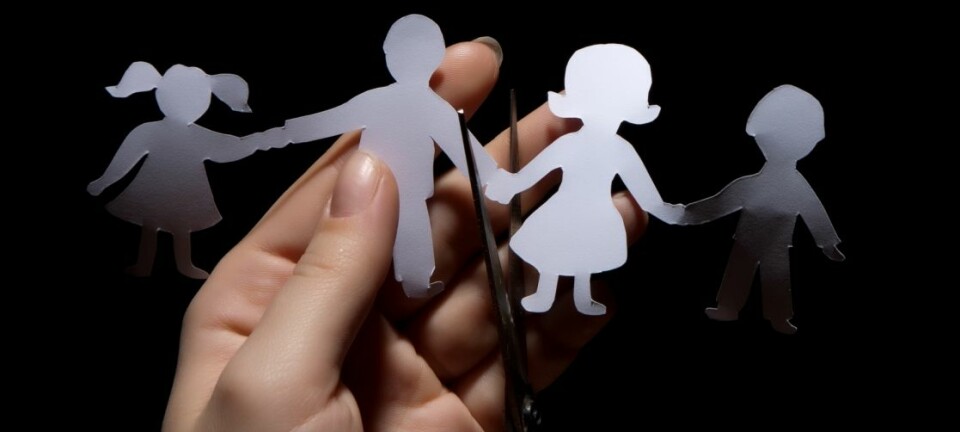
Older teens tackle divorces adeptly
Today’s adolescents generally excel at taking care of one another. Researchers think such empathy and friendship is helping them come to grips with parents’ divorces.
Denne artikkelen er over ti år gammel og kan inneholde utdatert informasjon.
Some 10,000 to 25,000 Norwegian kids experience a split-up of their parents annually.
Could it be easier for teenagers to cope with divorces or splits between parental partners because such dissolutions have become so ordinary?
According to the researcher Henok Zeratsion the answer is yes. At least for the kids in late adolescence when the divorces occur.
No difference
He studied a group of Oslo youth for three years and registered their reactions if their parents broke the knot. Those who were 15 or older when their parents went separate ways were no more susceptible to psychological problems than their peers with parents under the same roof.

This was the case for the prevalence of internalised problems like anxiety and depression, as well as externalised ones — conduct issues like agitation, hyperactivity, fighting and theft. The researchers found no significant differences in this respect between boy and girls.
The study was based on a questionnaire sent to all 10th graders in Oslo. The youth in this cohort were first questioned in 2001/02 and then followed up in 2003/04.
Previous studies from Norway and abroad have shown that youth who have experienced a divorce are at higher risk of developing mental problems.
More acceptable
Perhaps we are seeing a transformation underway here?
Research carried out among adolescents via the North-Trøndelag County Health Study (HUNT) in 1997 and 2001 showed that teens with divorced parents were more likely to have anxiety and depression problems than other youth, at least if they had experienced the divorce during childhoods.
The study did not reveal the impact on the kids if their parents split up later in adolescence, which makes it hard to compare these two studies. Nevertheless, the researchers behind the study in Oslo it’s worth considering whether a change has occurred.
“This does not necessarily mean that divorces cause fewer problems than they used to. As divorces started to get more common, the adolescents can have developed ways of shielding themselves from these adverse health effects,” says Zeratsion.
He thinks today’s youth are no longer subjected to the same stresses and stigmas that used to trouble kids with divorced parents.
“We no longer see these youth as persons with special problems or disqualifications. It’s more acceptable to be a parental divorce youth,” he says.
Watching each other’s backs
The researchers have not investigated why teens with divorced parents are no longer encountering more problems than their peers. But Bjørgulf Clauss, a professor in public health at the University of Oslo, thinks we need to know what, if anything, has happened.
He thinks that contemporary teens enjoy better networks, and these can help them tackle parental divorces better than kids used to.
All 10th graders in Oslo
While unfeasible in comparable studies, data from the survey in Oslo has made it possible to follow up the same cohort of youngsters — first when they were 15 or 16, then when they were 18 or 19.
But are Oslo teenagers different than teens outside the Norwegian capital? Could that have contributed to the surprising result?
“Our data says something about how things are in an urban context. But we are talking here about a city with estensive social and ethnic differences, which should mean that it gives a representative picture. Maybe we need more research on how things are outside the city areas. We should also follow up this cohort in ten years. Then we can say something about the developments,” says Claussen.
The researchers point out that the number that had experienced the divorce of their parents when they were aged 15 to 19 was relatively small, consisting of just 109 teenagers. This could have had an impact on the result. But they think the study suggests it is likely that there could be no difference in risk of mental and behavioural problems between the teenagers who experienced parental divorces and other teens that didn’t.
They refer to another study, conducted in Finland, which points in the same direction. It shows that youth who get new care care-givers and parental figures, often because of a divorce, are no more susceptible to depression than others their age.
Signs of risk behaviour
Nordic researchers in sociology and psychology studying teenagers often look for signs of risk behaviour including their use of tobacco, drinking and using drugs.
Researchers usually find a strong correlation between parental divorces and various degrees of risk behaviour. But they didn’t see that in the Oslo study. So they conclude that the risks of such substance use was no greater than for other teens. It should be noted, however, that this applied to those teens who were subjected to a parental divorce after they were 15 or older.
Bjørgulf Claussen thinks the study ought to play a greater role in the general public discourse about teenage conduct and how we view the consequences of divorces.
“Certainly we can use the data to speculate about what has happened with young people in these years. It’s intriguing if the picture of them reacting more mildly is correct. Not enough research has been conducted on the consequences of divorces,” he says, while adding:
“Among other things, perhaps teachers should be more attentive to the ones who react strongly — for there are still some who do.”
The youngest are harder stricken
In keeping with the longitudinal health study in North Trøndelag County, the survey of Oslo teenagers showed that the kids who had experienced a parental divorce at an earlier age were more likely to be plagued by anxiety and depression than other kids. The likelihood of such problems dropped year for year as the divorces occurred later in their lives.
In short, the younger the adolescents were when their parents split up, the greater their risk of mental problems.
“And the younger the youth are, the lesser their chances for obtaining support and care from peers,” says Zeratsion.
Long-term effect
Psychology Professor Ingunn Størksen got her PhD on the subject of adolescents and divorces, using data from the HUNT study in 1997 and 2001. She is delighted that teenagers appear to be tackling parental divorces without increased risks of mental problems.
She agrees that the young people are adept at supporting one another and that being together with friends and other networks is a contributing factor.
“These are just as important as parents at this age,” says Størksen.
She remarks, however, that we should not forget the long-term effects of divorces. Her research has revealed that young adults who experienced one or more divorces in the course of their lives ran a higher risk of also getting divorced. Moreover, they were more prone to exhibit symptoms of anxiety and depression.
“It’s conceivable that these teenagers who are experiencing divorces will encounter reactions later in life. We don’t know,” she says.
------------
Read the Norwegian version of this article at forskning.no
Translated by: Glenn Ostling
Scientific links
- Henok Zeratsion et. al.: Parental divorce in late adolescence does not seem to increase mental health problems: a population study from Norway. BMC Public Health 2013, 13:413 doi:10.1186/1471-2458-13-413
- Henok Zeratsion et. al.: Does Parental Divorce Increase Risk Behaviors among 15/16 and 18/19 year-old Adolescents? A Study from Oslo, Norway. Clin Pract Epidemiol Ment Health. 2014 Jun 13;10:29-66. doi: 10.2174/1745017901410010059.


































